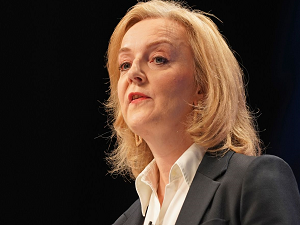
Q Radio News/PA
The UK and EU have reiterated their determination to find “durable solutions” to the Northern Ireland Protocol after a meeting on the contentious trading arrangements ended without a breakthrough.
Foreign Secretary Liz Truss and European Commission vice president Maros Sefcovic issued a joint statement after taking stock of progress in negotiations to reduce red tape associated with the disputed Irish Sea trade rules.
Talks between the two sides will now continue, but it is anticipated engagement will be more low key in the coming weeks and months, with London and Brussels keen to avoid raising tensions amid the forthcoming Assembly election campaign in Northern Ireland.
On Monday, Ms Truss and Mr Sefcovic jointly chaired an EU/UK committee on the implementation of the protocol.
Afterwards, Ms Truss said unilaterally suspending elements of the protocol – by triggering Article 16 mechanism – remained an option for the UK Government, but she said her focus was on finding a negotiated solution with the EU.
“Article 16 is in the protocol as a safeguard if things aren’t working as they should,” she said.
“But what I want to do is achieve through constructive negotiations the solutions in place to benefit both communities in Northern Ireland.”
Mr Sefcovic said intensified negotiations over recent months to find an agreed settlement, discussions that involved more than 100 meetings, had so far resulted in “neither a breakthrough nor a breakdown”.
Mr Sefcovic, who described his relationship with Ms Truss as “positive” and “excellent”, said talks would continue with a “laser focus” on practical solutions.
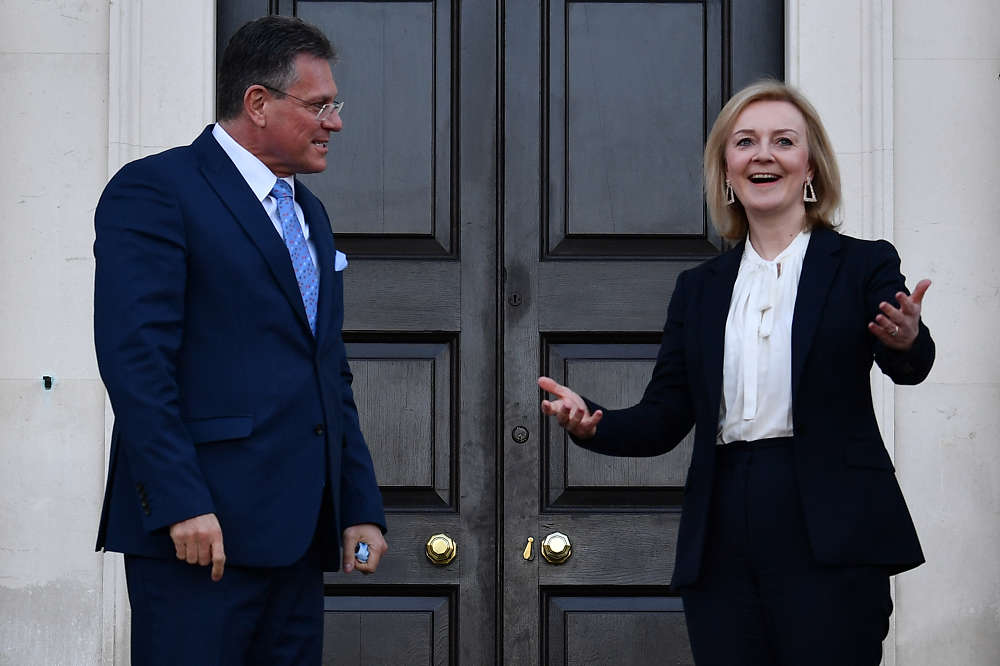 Foreign Secretary Liz Truss and European Commission vice president Maros Sefcovic
Foreign Secretary Liz Truss and European Commission vice president Maros Sefcovic
The EU and UK are attempting to find an agreed way of reducing customs paperwork and the number of agri-food checks required on goods moving from Great Britain to Northern Ireland under the terms of the protocol.
Asked if there was a deadline for making progress, Mr Sefcovic told a press conference in Brussels that the EU was “not in the business of setting artificial deadlines”.
“With Liz Truss we are determined to keep our eyes on the ball to find durable solutions for the benefit of Northern Ireland,” he said.
Mr Sefcovic added: “My objective remains the same – to provide Northern Ireland and all stakeholders on the ground with stability, predictability and opportunities stemming from the protocol.
“Ultimately, this is the only way to protect the hard-earned gains of the Good Friday/Belfast Agreement in all its dimensions, while avoiding a hard border on the island of Ireland and minimising disruptions caused by Brexit without compromising the integrity of the EU’s single market.”
The protocol has created new economic barriers on trade between Northern Ireland and the rest of the UK.
Agreed by the UK and EU to ensure no hardening of the Irish land border post-Brexit, it has instead moved regulatory and customs checks to the Irish Sea, with Northern Ireland remaining in the EU single market for goods. The region also applies the EU customs code at its ports.
Unionists and loyalists claim the arrangements have undermined the sovereignty of the UK and have demanded that the UK trigger Article 16 to suspend the protocol.
However, a majority of Assembly members at Stormont support the protocol, claiming it offers Northern Ireland a degree of protection from what they portray as the negative economic consequences of Brexit.
Earlier this month, the main unionist party in the region – the DUP – withdrew its first minister from Stormont’s powersharing executive in protest against the protocol – a move that effectively collapsed the administration and removed its power to take significant decisions.
The Assembly election is scheduled for May 5 and the protocol is set to be one of the dominant issues in the campaign.
After Monday’s meeting, Mr Sefcovic reported progress on one issue of concern for the EU – gaining access to UK data on the movement on goods across the Irish Sea.
He welcomed that access to UK IT databases was “finally materialising”.
The joint EU/UK statement issued after the meeting read: “Vice president Sefcovic and Foreign Secretary Truss underlined that the UK and EU share an overriding commitment to protect the Good Friday or Belfast Agreement of April 10 1998 in all its dimensions.
“Vice president Sefcovic and Foreign Secretary Truss took stock of the intensified and constructive talks that have taken place between them over the last months.
“They underlined the ongoing determination of both parties to ensure that the outstanding issues in the context of the protocol are addressed, and durable solutions found for the benefit of citizens, businesses and stability in Northern Ireland.”
The joint statement continued: “In addition, vice president Sefcovic and Foreign Secretary Truss reiterated the importance of further engagement, including with the Northern Ireland Assembly and Executive, and wider Northern Ireland civic society and business.
“Vice president Sefcovic and Foreign Secretary Truss noted that the joint bodies established by the Withdrawal Agreement should meet regularly, and agreed to discuss any point raised by the EU or the UK that is of relevance to the Withdrawal Agreement in general.”
The joint EU/UK committee also focused on the wider issue of post-Brexit citizens’ rights on Monday.
Mr Sefcovic said he had highlighted two issues related to EU citizens living in the UK.
He raised concern that EU citizens could lose residence status if they did not apply in time to change their status from pre-settled to settled.
He also asked for clarity on whether EU citizens with new resident status had those rights guaranteed under the Brexit Withdrawal Agreement or under UK immigration law.
Mr Sefcovic said he had “regret” on the UK position on both issues and said the matters had the potential to place a “question mark” over progress that has been made on citizens’ rights.
However, the senior diplomat said he hoped a resolution could be found.
“I still believe that we can and we should find an amicable solution to this issue and we’ll be working with the UK to resolve these matters,” he said.
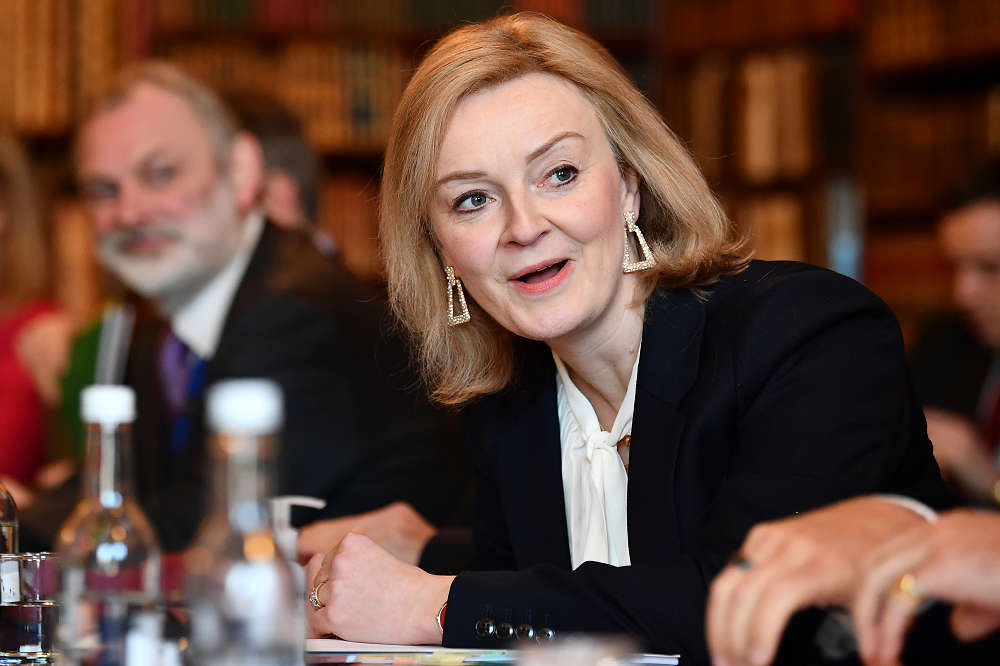 Foreign Secretary Liz Truss
Foreign Secretary Liz Truss


 Woman assaulted while jogging in West Belfast
Woman assaulted while jogging in West Belfast
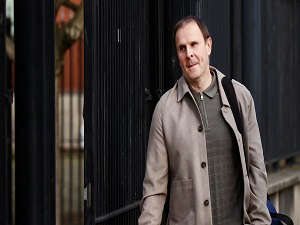 Leading loyalist Winston Irvine sentenced to 30 months for firearms offences
Leading loyalist Winston Irvine sentenced to 30 months for firearms offences
 Rescue operation to free 40 cows after lorry overturns on motorway
Rescue operation to free 40 cows after lorry overturns on motorway
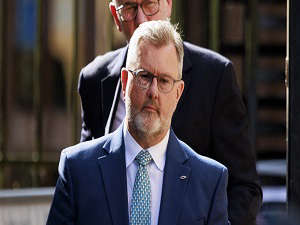 New date set for trial of former DUP leader Jeffrey Donaldson and wife
New date set for trial of former DUP leader Jeffrey Donaldson and wife